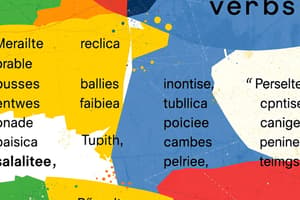Podcast
Questions and Answers
¿Qué hiciste ayer por la tarde? ¿Saliste? o No, ______ quedé en casa y luego ______ acosté muy pronto.
¿Qué hiciste ayer por la tarde? ¿Saliste? o No, ______ quedé en casa y luego ______ acosté muy pronto.
me
Pues ______ estuve con Héctor y fuimos a cenar a un restaurante mexicano.
Pues ______ estuve con Héctor y fuimos a cenar a un restaurante mexicano.
yo
Hablé, comí, salí, ¿_?
Hablé, comí, salí, ¿_?
hablaste
Comió, salió, hablamos, ¿_?
Comió, salió, hablamos, ¿_?
Salisteis, hablaron, comieron, ¿_?
Salisteis, hablaron, comieron, ¿_?
Hice, vine, estuve, ¿_?
Hice, vine, estuve, ¿_?
Hiciste, viniste, estuviste, ¿_?
Hiciste, viniste, estuviste, ¿_?
Hizo, vino, estuvo, ¿_?
Hizo, vino, estuvo, ¿_?
Hicimos, vinimos, estuvimos, ¿_?
Hicimos, vinimos, estuvimos, ¿_?
Hicieron, vinieron, estuvieron, ¿_?
Hicieron, vinieron, estuvieron, ¿_?
Flashcards
What does "me quedé" mean?
What does "me quedé" mean?
"Me quedé" means "I stayed". It's used when referring to staying somewhere.
What does "yo estuve" mean?
What does "yo estuve" mean?
"Yo estuve" translates to "I was". It refers to a temporary state or location.
What does the "-aste" ending indicate in the preterite tense?
What does the "-aste" ending indicate in the preterite tense?
The "-aste" ending is used for the "tú" form of -ar verbs in the preterite tense.
What does the "-imos" ending indicate in the preterite tense?
What does the "-imos" ending indicate in the preterite tense?
Signup and view all the flashcards
What does the "-ieron" ending indicate in the preterite tense?
What does the "-ieron" ending indicate in the preterite tense?
Signup and view all the flashcards
What does "fui" mean?
What does "fui" mean?
Signup and view all the flashcards
What does “fuiste” mean?
What does “fuiste” mean?
Signup and view all the flashcards
What does "fue" mean?
What does "fue" mean?
Signup and view all the flashcards
What does "fuimos" mean?
What does "fuimos" mean?
Signup and view all the flashcards
What does "fueron" mean?
What does "fueron" mean?
Signup and view all the flashcards
Study Notes
Hablar del pasado
- Expresar lo que hicimos ayer utilizando el pretérito indefinido.
- Ejemplos de verbos regulares: hablar (hablé, hablaste, habló, hablamos, hablásteis, hablaron), comer (comí, comiste, comió, comimos, comisteis, comieron), salir (salí, saliste, salió, salimos, salisteis, salieron).
- Ejemplos de verbos irregulares: hacer (hice, hiciste, hizo, hicimos, hicisteis, hicieron), venir (vine, viniste, vino, vinimos, vinisteis, vinieron), estar (estuve, estuviste, estuvo, estuvimos, estuvisteis, estuvieron), ir/ser (fui, fuiste, fue, fuimos, fuisteis, fueron).
Iniciar una conversación telefónica
- Formas de inicio: ¿Diga?, ¿Dígame?, ¿Sí?
- Preguntas y respuestas: ¿Está Ignacio? (Sí, soy yo), ¿De parte de quién? (Un momento, ahora se pone), ¿Está en la ducha? (No, no está), ¿No está? (No, no es aquí).
GRAMÁTICA
- Presente de indicativo: verbos irregulares con alternancia o - ue (verbo poder).
- Uso del presente de indicativo en la conversación.
Hablar de espectáculos
- Preguntas y respuestas sobre horarios y lugares: ¿Qué día actúa Rita Sosa?, ¿A qué hora?, ¿En qué cine ponen El Sur?, ¿Qué hay en la Galería Estampa?
- Formas de responder: ¿Qué día?, ¿A qué hora?, ¿En qué lugar?
Comunicación
- Hacer una invitación y aceptarla o rechazarla: ¿Vamos al cine esta noche?, ¿Quieres venir? (Vale, De acuerdo, Muy bien), ¿Lo siento, pero no puedo? (Es que tengo que estudiar, un compromiso).
- Concertar citas: ¿Quedamos mañana por la noche?, ¿Nos vemos mañana por la noche?, ¿Cómo quedamos?
Studying That Suits You
Use AI to generate personalized quizzes and flashcards to suit your learning preferences.




